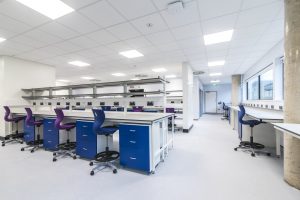Cancer immunotherapy is an exciting and expanding area of research. The convergence of new technology and leading scientific minds has brought us to a point where we are able to alter the course of cancer in ways we could only imagine a few decades ago.
Scientists from the Centre for Cancer Immunology are leading pioneering international collaborations and research studies to find new ways to fight cancer.
The Southampton, LaJolla, Oxford collaboration
Centre scientists are leading a team of international experts from Southampton, the Oxford Cancer Research UK Centre and the La Jolla Institute of Allergy and Immunology, to investigate why some tumours respond so well to immunotherapy.
The project, funded by CRUK, aims to identify patients who are most likely to benefit from these types of treatment and find ways of making it more effective for more people.
The study focuses on melanoma, lung and oesophageal cancers, for which new types of treatment are badly needed.
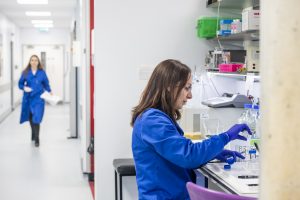
The antigen processing programme
Centre scientists were awarded £1.7m by CRUK to find out how cancer antigens are processed and presented to cytotoxic T lymphocytes, thereby activating them to kill tumours.
The results could be used to predict which cancer-associated genes would be effective targets for vaccines. The study will use mathematical models that capture our understanding of antigen processing, which will be the only ones that take into account the full impact of natural human variation on this important process.
The multidisciplinary study will include Head and Neck cancer surgeon Emma King, University of Southampton proteomics expert Paul Skipp and Thanos Papakyriakou Computational Chemist at Demokritos in Athens. The team will also work with computer scientists at Microsoft Research.
This research compliments a collaboration between the Centre and Grey Wolf Therapeutics and pharmaceutical company Sanofi. This work is developing new anti-cancer drugs that target an enzyme, which is key in controlling the amount of cancer antigen that is made by tumours.
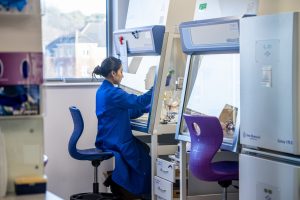
Improving antibody immunotherapies
Antibodies are specialised proteins in the blood that recognise foreign substances, such as bacteria and viruses, and target them for attack by the immune system. Researchers can also modify antibodies in the lab (monoclonal antibodies) to use as treatments to fight cancer, either by specifically targeting cancer cells so they are destroyed by the immune system, or by “re-awakening” immune cells that have been switched off by the cancer.
Unfortunately, these monoclonal antibody treatments are not always effective in every patient and some cancers can develop resistance to them, so further research is needed to improve these therapies.
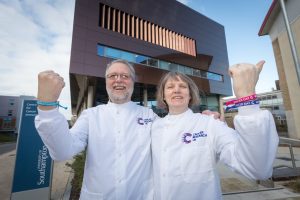
Almost all monoclonal antibodies work by interacting with a series of receptors on immune cells called the Fc gamma receptors (FcgR). Recently, it has been shown that cancer cells can change the expression pattern of these receptors, reducing the potency of the antibody treatments.
Scientists at the Centre for Cancer Immunology, funded by CRUK, are studying the fundamental biology of these FcgRs. In particular, they are looking at how the cancer cells can change the FcgR expression patterns and how they can be manipulated to improve patient responses to antibody immunotherapy treatments.
Although this initial research will focus on antibodies used in the treatment of lymphoma, such as Rituximab, it is expected that the outcomes of their work will also benefit other monoclonal antibody treatments in a range of other cancers in the future.
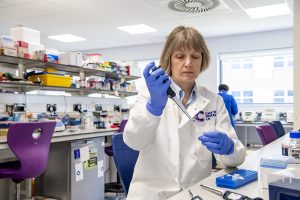
World-first neuroblastoma trial
The Centre for Cancer Immunology is proud to be a part of the world-first trans-Atlantic clinical trial that will test a new three-part treatment for neuroblastoma, one of the most common childhood cancers.
The Phase I trial involves doctors and cancer scientists in Southampton, America and Germany and is funded by UK charities Solving Kids’ Cancer (Europe), JACK and US charities Solving Kids’ Cancer and Band of Parents.
Neuroblastoma affects around 100 children – mostly under the age of five – in the UK every year and develops from immature nerve cells. Less than half of patients are cured despite intensive treatment which includes surgery, chemotherapy, radiotherapy and stem cell transplants.
More recently, a form of immunotherapy, which uses antibodies to lock onto cancer cells via a molecule called GD2 so the immune system can find, fight and destroy them, has shown the potential to improve survival rates.
Dr Juliet Gray, University of SouthamptonThis trans-Atlantic trial will be the first time these drugs have been tested together and we are hopeful the combination of treatments will substantially improve the cure rate of children with this form of cancer.
This new study, led by Dr Juliet Gray, Associate Professor of Paediatric Oncology at the University of Southampton, involves combining mIBG, a special form of targeted radiotherapy which delivers radioactive iodine directly to neuroblastoma cells, with two different antibody therapies for the first time.
One of these therapies, Nivolumab, has shown exciting results in adult cancers. It blocks a harmful protein called PD-1 and gives patients’ own immune cells a boost so that they can be set free to kill tumour cells.
The researchers will give Nivolumab alongside the currently-used anti-GD2 to target specific cancer cells while protecting normal healthy cells.
The researchers plan to give an initial course of mIBG-targeted radiotherapy followed by Nivolumab and anti-GD2 over a period of six months. Although the initial stages of the treatment process will require children to be in hospital, it is hoped that the therapy will be well tolerated and will eventually be delivered largely on an outpatient basis.
The trial’s objective is to ensure the combination is safe to deliver to children with neuroblastoma in order to develop further studies to compare it with current treatments.

The RiVa trial
The Centre for Cancer Immunology prides itself on being able to translate basic scientific discoveries into meaningful treatments that will improve patients’ lives. The RiVa trial embodies this culture.
Dr Sean Lim found that a particular combination of antibodies –targeting CD27 and CD20, greatly increased life expectancy in mice with cancer. The study found that the antibody combination increased the number and ability of a specific type of immune cells, called myeloid cells, to destroy cancer cells.
This combination is now being tested in a Phase IIA clinical trial in humans, which is evaluating the safety and efficacy of combining a direct tumour targeting antibody (rituximab) with a immunostimulatory antibody (varlilumab) for the treatment of patients with relapsed or treatment-refractory B-cell lymphoma.
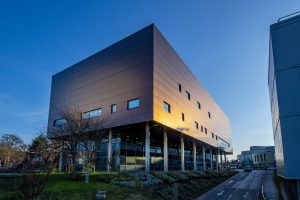
Super-resolution microscopy
Macrophages are large white blood cells that destroy foreign bodies by ‘eating’ them, and in addition to being able to engulf tumour cells, can also interact with T cells in the immune system to stimulate anti-tumour immunity.
Centre scientists, funded by the Wellcome Trust, are conducting a study analysing how antigens (a protein from foreign bodies such as bacteria or viruses, but also possibly from cancer cells), bind to immune system proteins called antibodies, travel within the macrophage. The overall goal is to understand how these proteins behave in macrophages, thereby transmitting information to other immune cells.
Until recently, methodology to study processes such as the movement of proteins within cells that occur on microscopic scales (around one millionth of a centimeter) at very high resolution has been unavailable.
But scientists at the Centre have developed advanced microscopy techniques that can observe these processes in real time in live cells.
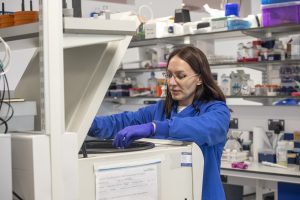
Developing the next generation of cancer immunotherapy treatments
Antibody-drug conjugates (ADCs) deliver a “magic bullet” directly to cancer cells.
While the development of ADCs has seen an exciting leap forward in recent years – they currently feature in around 60 clinical trials for patients worldwide – the downside is that the drugs are aggressive and in some cases, they have proved simply too toxic for some patients.
However, in a research programme funded by CRUK, scientists at the Centre for Cancer Immunology are finding ways to better engineer ADCs. The study will also give a clearer understanding of how they are working in the body, enabling the team to develop new drugs which are less aggressive but just as effective in shrinking a tumour.
